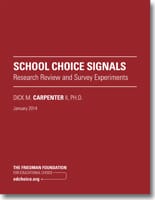 A new survey from the Friedman Foundation for Educational Choice delivers a thorough look at how the public views an array of school-choice issues. The results could surprise even some seasoned policymakers and wonks. After a useful literature review summarizing decades of opinion research on school choice, the author digs into the results of his nationally representative survey: First, respondents were asked whether they support or oppose various forms of school choice, and he found greater public enthusiasm for tax credits and savings accounts than for vouchers. Second, respondents were asked a series of questions to determine whether arguments favoring school choice were more persuasive if they invoked ideals of freedom, competition, or equality. Freedom prevailed. Third, as is often the case, respondents felt that reducing class sizes would be quite effective in improving our education system relative to the other ideas offered. Among the reform ideas tested, support for “vouchers is in the middle of the pack, with smaller class sizes, technology, and accountability perceived as more efficacious and reducing teachers’ unions’ influence, merit pay, and longer school days as less efficacious.” This all would seem to indicate the need for school-choice supporters to go big with their proposals to reach as many kids as possible. Logically, support may dwindle to the extent the public feels a given policy does not affect them. In addition, policies should be designed to ensure options are broad-based, diverse, high quality, technologically current, and—most of all—student centered.
A new survey from the Friedman Foundation for Educational Choice delivers a thorough look at how the public views an array of school-choice issues. The results could surprise even some seasoned policymakers and wonks. After a useful literature review summarizing decades of opinion research on school choice, the author digs into the results of his nationally representative survey: First, respondents were asked whether they support or oppose various forms of school choice, and he found greater public enthusiasm for tax credits and savings accounts than for vouchers. Second, respondents were asked a series of questions to determine whether arguments favoring school choice were more persuasive if they invoked ideals of freedom, competition, or equality. Freedom prevailed. Third, as is often the case, respondents felt that reducing class sizes would be quite effective in improving our education system relative to the other ideas offered. Among the reform ideas tested, support for “vouchers is in the middle of the pack, with smaller class sizes, technology, and accountability perceived as more efficacious and reducing teachers’ unions’ influence, merit pay, and longer school days as less efficacious.” This all would seem to indicate the need for school-choice supporters to go big with their proposals to reach as many kids as possible. Logically, support may dwindle to the extent the public feels a given policy does not affect them. In addition, policies should be designed to ensure options are broad-based, diverse, high quality, technologically current, and—most of all—student centered.
SOURCE: Dick M. Carpenter II, School Choice Signals: Research Review and Survey Experiments (Indianapolis, IN: Friedman Foundation for Educational Excellence, January 2014).

